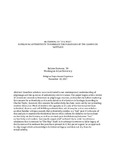Returning to "The Way": Reframing Authenticity to Embrace the Paradoxes of the Camino de Santiago

View/
Author
Hartness, Ralston C.
Subject
Washington and Lee University -- Capstone in Religion
Camino de Santiago de Compostela
Pilgrims and pilgrimages
Authenticity (Philosophy)
Metadata
Show full item recordDescription
Capstone; [FULL-TEXT FREELY AVAILABLE ONLINE] Ralston C. Hartness is a member of the Class of 2018 of Washington and Lee University. Countless scholars have contributed to our contemporary understanding of pilgrimage and the question of authenticity which it raises. This paper begins with a review of prominent secondary literature on pilgrimage, tourism, and modernity before exploring the concern for authenticity as it is articulated on the Camino de Santiago. According to Charles Taylor, however, this concern for authenticity has been worn out by our prevailing modern discourse. Much of modern ethnography and study of the Camino prioritizes individual, diverse, and self-fulfilling authenticities, which may be just as one-sided as another familiar critique, namely that authenticity resides in a “lost” past. It is the aim of this analysis to examine the theoretical lenses which inform the debates we have about authenticity on the Camino, as well as to reach past the dichotomy between “lost” authenticity and modern, “personally-negotiated” authenticity in order to retrieve a wholeness that is intrinsic to “The Way” itself. In its attempt to retrieve a fuller legacy of the Camino and to embrace the paradoxes present in it, this paper argues for an approach to pilgrimage which acknowledges its historical legacy and does not shy from its inexplicability.